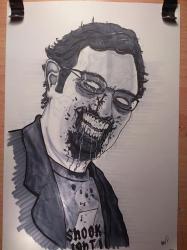There’s a good chance that most of the people reading this won’t remember the Cold War. For a fairly large slice of the population, the supposed threat of imminent nuclear annihilation from (depending on where you lived) either an Evil Red Empire focused on nothing but the death of truth, justice and Coca-Cola; or the equally evil capitalist Imperial scum who would grind you into the dirt to make money from your labour at the first opportunity, never existed.
However, for those of us who grew up through the 80s when insane old men had their fingers on the launch buttons of almost 100,000 nuclear warheads, it was a very real threat. The ramping up of the Cold War with the deployment of SS-20 missiles by the USSR and nuclear-armed cruise missiles by the USA in Europe, neither weapon really capable of hitting the other country’s heartland but more than capable of wiping Central and Western Europe off the map, created a climate of fear without any historical parallel.
It was this climate of fear that gave us Threads. A TV movie created for the BBC in 1984, less than a year after World War III was almost started accidentally (don’t ask), it uses the threat of war as a prism to view the human condition through and examine just how fragile the threads that hold society together really are.
At some point in the 1980s an American-backed coup deposes the Iranian government and prompts the Soviet Union to send troops into the north of the country in support of the Islamic republican regime. America counters by deploying a huge contingent of military forces into the Gulf, sparking fears of a direct confrontation between the superpowers. US and Soviet ships clash in the Persian Gulf, further heightening tensions. In Sheffield, we see life carrying on as normal against this backdrop: pregnant Ruth and her fiancée Jimmy work at decorating their house, while we meet their families who are not exactly in love with the prospective marriage. Meanwhile an Emergency Operations Team is assembled in the basement of Sheffield City Hall and additional NATO combat aircraft are deployed to nearby RAF Finningley.
When a force of American B-52 bombers attacks, a Soviet base in northern Iran is shot down with a nuclear-armed surface-to-air missile, US forces respond by firing a 100-kiloton missile at the base. Fighting stops for a while, but resumes a few days later between American and Soviet naval forces. The war quickly escalates into an all-out strategic nuclear exchange: Sheffield is hit by the blast from a missile aimed at the Finningley airbase, before the Soviets switch targets to industrial centres and the city is hit directly by a multi-megaton weapon.
The aftermath is truly horrific. Radioactive fallout from an attack on Crewe drops across Sheffield, killing thousands slowly through radiation poisoning. Many more starve, trapped in the ruins and unable to escape. As nuclear winter sets in, martial law is declared and looters shot on sight. Ruth survives the destruction of her home but dies ten years later, psychologically shattered and physically crippled from radiation poisoning. The population of the UK falls to somewhere between 4 and 11 million, with children becoming educationally and linguistically stunted through a combination of society’s collapse and adult apathy rising from a nationwide form of PTSD. In a shocking finale, we see Ruth and Jimmy’s teenaged daughter give birth to a child of her own, stillborn and deformed from the radiation still contaminating the world.
Threads is a product of its time, a heavy dose of reality in a time when Ronald Reagan tried to convince the world that he could build lasers that would shoot down the USSR’s entire arsenal. To this day my ex-girlfriend is so freaked out about it that she will not visit Sheffield. Unlike the usual disaster movie this piece is a two-hour bucket of cold water to the face and a reminder that, if World War III had broken out in the 1980s, nobody could have won.
Ok, you’ve read the article. Want to watch it? Enjoy:





Nerd Comments